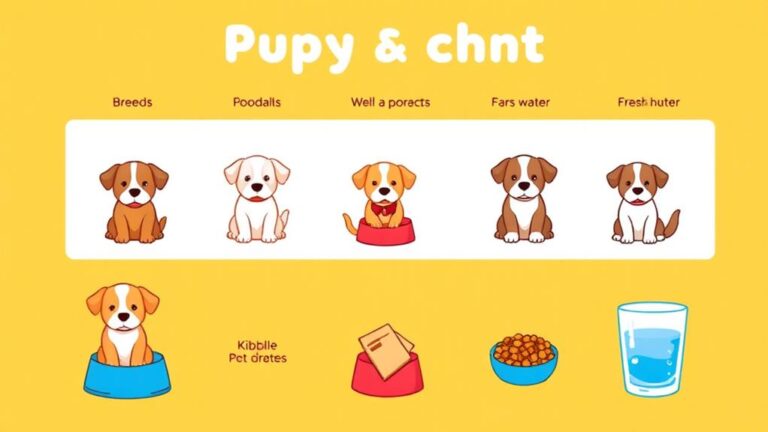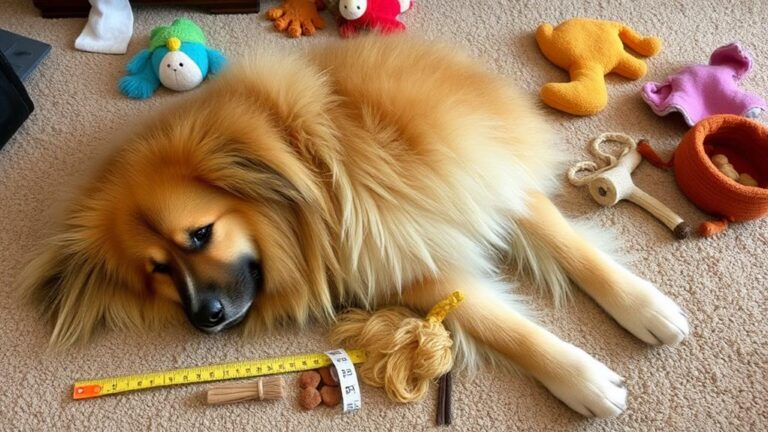Determining how much a puppy should eat each day can be a bit confusing, especially for new pet owners. Puppies require different amounts of food based on their weight and age, with guidelines suggesting, for example, that a 3-5 lb puppy might need around 1 to 1 1/3 cups daily. However, feeding is not just about quantity; it also involves recognizing signs of hunger and ensuring proper nutrition. As we explore these guidelines and tips further, you may find some surprising insights into your puppy's dietary needs.
Puppy Feeding Guidelines by Weight
Feeding your puppy the right amount of food is very important. Puppies need good nutrition to grow strong and healthy. The amount of food a puppy needs depends on their weight.
For example, a puppy that weighs between 3 and 5 pounds needs about 1 to 1 1/3 cups of food each day. This is especially important when they are very young, from 6 to 12 weeks old.
As the puppy gets older, the amount of food they need changes. When they are 3 to 4 months old, they only need about 3/4 to 1 cup of food each day.
Larger puppies, like those that weigh between 10 and 20 pounds, need more food. They should eat around 2 1/2 to 4 cups of food daily.
It's important to remember that puppies grow quickly, so their food amounts must be adjusted as they gain weight.
Monitoring your puppy's food intake helps prevent problems like being too hungry or too full. Both can affect their health.
Good feeding practices now will help your puppy grow into a healthy and happy dog. Remember, proper nutrition is key to helping your puppy thrive!
Feeding Frequency Recommendations
Feeding your puppy the right amount of food is important, but knowing how often to feed them is just as crucial. Puppies grow quickly and need to eat more often than adult dogs. The feeding frequency can change based on how old they are.
For puppies aged 6 to 12 weeks, you should feed them 3 to 4 times a day. This helps them get the energy they need to play and grow.
When your puppy reaches 3 to 6 months old, you can start feeding them 3 times a day. As they get older, between 6 and 12 months, you can cut back to 2 meals a day.
Once your puppy is over 12 months old, stick with 2 meals a day or follow what your vet says. It's important to keep a regular feeding schedule. A consistent routine can help your puppy's tummy feel good and teach them good habits.
Don't forget to adjust the portion sizes too! The amount of food will depend on how much your puppy weighs and how active they are.
Always check the food package for serving sizes or ask your vet for advice. Feeding your puppy at the same times each day will make them feel safe and happy as they grow!
Signs of Adequate Nutrition
A healthy puppy shows many signs that they are getting the right food. First, when you look at your puppy from above, you should see a waist. This shows that your puppy has a good shape and body weight.
Next, if you gently feel your puppy's ribs, you should be able to feel them easily. However, you should not see the ribs sticking out. That means your puppy is not too skinny.
Another sign of a well-fed puppy is their energy level. Healthy puppies are usually active and playful. They love to run around and play with toys. If your puppy is energetic, it's a good sign that they are doing well.
Regular trips to the bathroom also indicate that your puppy's food is aiding digestion properly. If your puppy has healthy poops, that's a great sign!
Lastly, make sure your puppy drinks enough water. They should drink about half an ounce to one ounce of water for every pound they weigh each day. Good hydration is essential for keeping your puppy healthy.
All these signs show that your puppy is thriving and getting the right nutrition. If you notice any changes in these signs, talk to a vet. They can help ensure your puppy stays healthy and happy!
Risks of Overfeeding
Taking care of a puppy means giving them good food in the right amounts. It's important to feed them enough to grow strong, but overfeeding can cause many problems. When puppies eat too much, they might get sick. They can vomit or have a tummy ache, which is uncomfortable for them and worrying for you.
Another big problem with overfeeding is weight gain. If a puppy gets too heavy, they can become lazy and not want to play. Instead of running around and being energetic, they may just want to lie down. This can make them less happy and active.
Also, when a puppy eats too much, their stomach can get too big, which hurts and irritates them. This is not good for their health. To help your puppy stay healthy and happy, it is very important to feed them the right amount of food.
You can do this by setting a fixed feeding schedule. Measure the portions of food carefully so you know they are getting the right amount. Make sure to follow the guidelines from your veterinarian about how much to feed your puppy.
Behavioral Indicators of Hunger
Knowing when your puppy is hungry is very important for their health. Puppies can't tell us when they need food, so we need to look for signs. They may show different behaviors that tell us they are ready to eat.
One sign is increased agitation. If your puppy is acting restless and can't seem to sit still, they might be hungry. You might notice them moving around a lot or trying to play but not being able to focus.
Another sign is biting behavior. If your puppy is biting on toys, your shoes, or even your hands more than usual, it could mean they are looking for food. They might be trying to get your attention because they need something to eat.
When puppies are hungry, they often seek food. You may see them going to their food bowl to check if there is any food left. They could also sniff around the house or follow you closely when you are in the kitchen.
Lastly, listen for vocalizations. Puppies might whine or bark when they are hungry. If your puppy starts making these sounds, it might be time to feed them.
Paying attention to these signs will help you make sure your puppy gets the nutrition they need to grow strong and healthy!
Tips for Healthy Feeding
Feeding your puppy is very important for their growth and health. It's best to choose a high-quality puppy food that is specially made for their needs. Look on the bag for the feeding guidelines based on your puppy's weight and age. This will help you know how much to feed them.
If your puppy is young, it's smart to divide their food into several small meals. You should feed them three to four times a day. This helps keep their tummy happy and their energy levels steady. Puppies can get sick if they eat too much at once.
Keep an eye on your puppy's body. You should be able to see a little waist and feel their ribs, but you shouldn't see them sticking out. This shows that your puppy is at a healthy weight. Try not to overfeed them. Eating too much can make them overweight, which can lead to health problems later.
Don't forget to always give your puppy fresh water. Staying hydrated is key to keeping them healthy. Change their water daily and make sure the bowl is clean.
When you feed your puppy right, you help them grow up strong and happy!
Conclusion
In summary, proper nutrition is essential for a puppy's growth and development. Following established feeding guidelines based on weight and age guarantees that puppies receive the necessary nutrients. Regularly adjusting food intake and maintaining a consistent feeding schedule contribute to their overall health. Observing signs of adequate nutrition and being mindful of overfeeding risks further supports ideal growth. Ultimately, understanding a puppy's needs fosters a healthy and happy companion.



